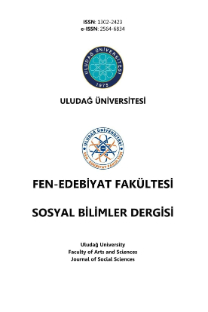Analysis of Urban Poverty by Cultural Factors: An Overview on Bursa Case
Türkiye
Kentsel Yoksulluk Sorununun Kültürel Faktörlerle Analizi: Bursa Örneği Üzerine Bir Değerlendirme
Turkey,
___
- Baeten, Guy. (2001) “The Europeanization of Brussels and the Urbanization of Europe: Hybridizing The City Empowerment and Disempowerment In The EU District”, European Urban and Regional Studies, 8(2).
- Bozkurt, Veysel. (2000), Püritanizmden Hedonizme Yeni Çalışma Etiği ("New Work Ethics from Puritanism to Hedonism"), 1st Edition, Bursa: Alesta Yayınevi.
- Danış, Didem. (2001), “İstanbul’da Uydu Yerleşmelerin Yaygınlaşması: Bahçeşehir Örneği”, 2001.Yüzyıl Karşısında Kent ve İnsan ("Satellite Settlements in Istanbul: Bahçeşehir Example", City and Individual vs. 21st Century), Ed. F. Gümüşoğlu, Istanbul: Bağlam Yayınları 171.
- DPT (SPO - State Planning Organization of Turkey) (2003), Sekizinci Beş Yıllık Kalkınma Planı (2003-2001) – 2005 Yılı Programı Destek Çalışmaları ‘Ekonomik ve Sosyal Sektörlerdeki Gelişmeler ("Eighth Five-Year Development Plan (2001-2005) - Supportive Efforts for the Year 2003 Program 'Developments in Economic and Social Sectors"), Ankara: D.P.T Yayını.
- Jargowsky, Paul A. and Bane, Mary Jo. (1991), “Ghetto Poverty In The United States,1970-1980”, The Urban Underclass, ed. C.Jenks – P.Petrson, Washington D.C: The Brooking Institution Press.
- Kasarda, John (1995) “Industrial Restructuring and the Changing Nature of jobs” in Reynolds Farley ed. State of the Unions: America 1990s, Volume One: Economic Trends, New York: Russel Sage Faundations.
- Krivo, Lauren J. and Kaufman, Robert L. (1999), “How Low Can It Go? Declining Black-White Segregation In a Multi-ethnic Context”, Demography, Volume 36(1)
- Kurtuluş, Hatice. (2005), “İstanbul’da Kapalı Yerleşmeler Beykoz Konakları Örneği”, İstanbul’da Kentsel Ayrışma ("Secluded Settlements in Istanbul, Beykoz Mansions Example", Urban Segregation in Istanbul), Ed. H.Kurtuluş,Istanbul: Bağlam Yayınları 243.
- Kuş, Elif (2003), Nicel-Nitel Araştırma Teknikleri ("Quantitative & Qualitative Research Techniques"), Ankara: Anı Yayınevi.
- Lewis, Oscar – Lewis, Ruth. (1956), “A Day In the Mexican Peasant Family”, Marriage and Family Living, Vol.18 (1).
- Lewis, Oscar. (1998), “The Culture of Poverty”, Society, Vol.35 (2).
- Lewis, Oscar (1980), The Children of Sanchez, “Introduction”, Penguin Books
- Massey, D. S., Gross, A. B. and Shibuya, K. (1994), “Migration, Segregation and the Geographic Concentration of Poverty”, American Sociology Review, Vol. 59(3)
- Massey, Douglas S. and Eggers, Mitchell L. (1990), “The Ecology of Inequality: Minorities and The Concentration of Poverty”, American Journal of Sociology, Vol. 95(5)
- Massey, Douglas S. (1990), “American Apartheid: Segregation and The Making of Underclass”, American Journal of Sociology, Vol. 96(2).
- Murray, Charles. (1984), Losing Ground / American Social Policy, 1950- 1980, U.S.A: Basic Books
- Oberti, Marco. (2000), “Diversity and Complexity In Local Forms of Urban Anti-Poverty Strategies In Europe”, IJURR, Vol. 24(3).
- Sosyal Hizmetler ve Çocuk Esirgeme Kurumu Web Sitesi (Social Services and Child Protection Society of Turkey web site): http://www.shcek.gov.tr/portal/dosyalar/ shcek/ kuruluslar/ krl_list/ cgmerk/ bursa. asp.11.07.06.
- Wilson, W. J. (1996-97), “When Work Disappears”, Political Science Quarterly, Vol. 1(4)
- Wilson, William J. and Aponte, Robert. (1985), “Urban Poverty”, Annual Review of Sociology, Vol. 11.
- Wilson, William J. (1992), “Another Look at The Truly Disadvantaged”, Political Science Quarterly, Vol.106 (4)
- ISSN: 1302-2423
- Yayın Aralığı: 2
- Başlangıç: 1999
- Yayıncı: Bursa Uludağ Üniversitesi
Osmanlı Bursa'sında İthalat ve Tüketim Kalıplarında Değişim (XIX. YY. İkinci YArısı)
Aksaray Valide Külliyesi İnşaat Defterleri
Kant'ta Etik Değerler Olarak Özgürlük ve Saygı
Afyon Karahisar İli Çay İlçesi Orhaniye Köyü Kırım Tatar Ağzı
İlköğretim Çağındaki 10-14 Yaş Grubu Öğrencilerinin Gelişim Özellikleri
Analysis of Urban Poverty by Cultural Factors: An Overview on Bursa Case
Bir Şehrin Edebiyata Yansıyan Acı Hikayesi: Milli Mücadelede Bursa
W.V.O. Quine's Naturalistic Approach to Epistemology
XIX. Yüzyılda Osmanlı İmparatorluğu'nda İmamlar Muhtarlar ve Köylüler: Balıkesir Örneği
